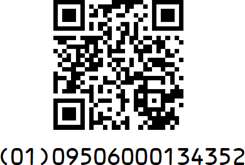How additional data is encoded is through the use of Application Identifiers
Application Identifiers(AI) enable several pieces of data to be encoded in one QR code so the information can be interpreted and processed correctly and consistently. GS1 Digital Link URI syntaxes enable the use of GTIN and additional data in barcodes.
Here are some common Application Identifiers that may be used with retail applications:
Examples
| Use cases | Supporting data |
|---|---|
| Traceability – product authentication, ingredient sourcing info, supply chain visibility, consumer trust . | GS1 Digital Link URI + GTIN + batch/lot number, serial number, country of origin . |
| Sustainability – recycling info, enables circular economy. waste prevention, farm-to-fork . | GS1 Digital Link URI + GTIN + expiration or best before date. |
| Supply Chain Efficiency – maintain FIFO, inventory accuracy, availability and location insight, avoid waste, ensure freshness. | GS1 Digital Link URI + GTIN + batch/lot number, serial number. |
| Safety – brand integrity, prevent sale of expired or recalled product, fight counterfeiting . | GS1 Digital Link URI + GTIN + batch/lot number, expiration or best before date, serial number . |
| Consumer engagement – access to brand authorised info, promotions, recipes, opportunities to engage with the brand. | GS1 Digital Link URI + GTIN. |
| Improved Packaging – marketing goals on pack, regulatory compliance and enhanced consumer experience . | GS1 Digital Link URI + GTIN. |
Not all GS1 Application Identifiers will be enabled across all retailers. Which AIs are available and able to be used can vary based on where it is being read. Also, just because it can be encoded doesn’t mean it should be encoded. Think about who is going to use the data and why. Would it be better to hold it within a database or website rather than in the barcode itself.
| AI | Data Content | Format* | Data Title |
|---|---|---|---|
| 01 | Global Trade Item Number (GTIN) | N2+N14 | GTIN |
| 10 | Batch or Lot Number | N2+X..20 | BATCH/LOT |
| 11 (**) | Production Date (YYMMDD) | N2+N6 | PROD DATE |
| 13 (**) | Packaging Date (YYMMDD) | N2+N6 | PACK DATE |
| 15 (**) | Best Before Date (YYMMDD) | N2+N6 | BEST BEFORE or SELL BY |
| 17 (**) | Expiration Date (YYMMDD) | N2+N6 | USE BY OR EXPIRY |
| 21 | Serial Number | N2+X..20 | SERIAL |
| 22 | Consumer product variant | N2+X..20 | CPV |
| 240 | Additional product identification assigned by the manufacturer | N3+X..30 | ADDITIONAL ID |
| 241 | Customer part number | N3+X..30 | CUST. PART No. |
| 243 | Packaging component number | N3+X..20 | PCN |
| 30 | Count of Items (Variable Measure Trade Item) | N2+N..8 | VAR. COUNT |
| 310n (***) | Net weight, kilograms (Variable Measure Trade Item) | N4+N6 | NET WEIGHT (kg) |
| 320n (***) | Net weight, pounds (Variable Measure Trade Item) | N4+N6 | NET WEIGHT (lb) |
| 392n (***) | Applicable Amount Payable, single monetary area (Variable Measure Trade Item) | N4+N..15 | PRICE |
| 393n (***) | Applicable Amount Payable with ISO Currency Code (Variable Measure Trade Item) | N4+N3+N..15 | PRICE |
| 395n (***) | Amount payable per unit of measure single monetary area (variable measure trade item) | N4+N6 | PRICE/UoM |
| 422 | Country of Origin | N3+N3 | ORIGIN |
| 7003 | Expiration date and time | N4+N10 | EXPIRY TIME |
| 8008 | Date and Time of Production | N4+N8+N..4 | PROD TIME |
Here is an example QR code powered by GS1 which encodes three pieces of data about a product besides URL and GTIN.
- Global Trade Item Number – 09506000134352
- Consumer product variant – 73
- Batch or Lot Number – ABC
- Production date – 18 July 2023
